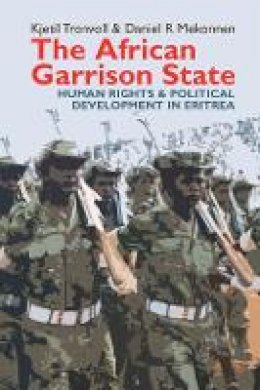
Stock image for illustration purposes only - book cover, edition or condition may vary.
The African Garrison State: Human Rights & Political Development in Eritrea REVISED AND UPDATED
Kjetil Tronvoll
€ 102.80
FREE Delivery in Ireland
Description for The African Garrison State: Human Rights & Political Development in Eritrea REVISED AND UPDATED
Hardback. A comprehensive study of how and why the bright prospects the new state of Eritrea had in 1991 were undercut, turning the country into one of the world's most authoritarian, militarised, isolated, and human rights-abusing states. Series: Eastern Africa Series. Num Pages: 223 pages, 1 black & white line drawings. BIC Classification: 1HFGE; JPVH. Category: (P) Professional & Vocational. Dimension: 243 x 165 x 19. Weight in Grams: 524.
WINNER: 2015 CHOICE Outstanding Academic Title Award Examines Eritrea's deprivation of human rights since independence and its transformation into a militarised "garrison state". When Eritrea gained independence in 1991, hopes were high for its transformation. In two decades, however, it became one of the most repressive in the world, effectively a militarised "garrison state". This comprehensive and detailed analysis examines how the prospects for democracy in the new state turned to ashes, reviewing its development, and in particular the loss of human rights and the state's political organisation. Beginning with judicial development in independent Eritrea, subsequent chapters scrutinise the rule of law and the court system; the hobbled process of democratisation, and the curtailment of civil society; the Eritrean prison system and everyday life of detention and disappearances; and the situation of minorities in the country, first in general terms and then through exploration of a case study of the Kunama ethnic group. While the situation is bleak, it is not without hope, however:the conclusion focuses on opposition to the current regime, and offers scenarios of regime change and how the coming of a second republic may yet reconfigure Eritrea politically. Kjetil Tronvoll is Professor of Peace and Conflict Studies at Bjoerknes College, founding and senior partner of the International Law and Policy Institute, Oslo, and a former Professor of Human Rights at the University of Oslo; Daniel R. Mekonnen is Senior Legal Advisor, International Law and Policy Institute, Oslo, and former Judge of the Zoba Maekel Provincial Court in Eritrea.
Product Details
Format
Hardback
Publication date
2014
Publisher
James Currey
Condition
New
Number of Pages
223
Place of Publication
Oxford, United Kingdom
ISBN
9781847010698
SKU
V9781847010698
Shipping Time
Usually ships in 7 to 11 working days
Ref
99-50
About Kjetil Tronvoll
KJETIL TRONVOLL is Professor of Peace and Conflict Studies at Bjørknes University College, Director of Oslo Analytica policy research and advisory company, and a former Professor of Human Rights at the University of Oslo. His books include, with Daniel R. Mekonnen, The African Garrison State: Human Rights & Political Development in Eritrea (2017).
Reviews for The African Garrison State: Human Rights & Political Development in Eritrea REVISED AND UPDATED
2015 CHOICE Outstanding Academic Title
.
The book will be well received by a wider readership, particularly among students of African regimes. . . . It will certainly stimulate and inform an ongoing debate on the national identity and constitutional future of Eritrea.
AFRICAN STUDIES QUARTERLY
This fantastically dense, thorough, rich, comprehensive tome breaks down Eritrean contemporary statehood and civil society in a way that should be copied as a model for modern political/national security case studies. Highly recommended.
CHOICE
.
The book will be well received by a wider readership, particularly among students of African regimes. . . . It will certainly stimulate and inform an ongoing debate on the national identity and constitutional future of Eritrea.
AFRICAN STUDIES QUARTERLY
This fantastically dense, thorough, rich, comprehensive tome breaks down Eritrean contemporary statehood and civil society in a way that should be copied as a model for modern political/national security case studies. Highly recommended.
CHOICE
